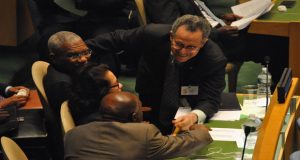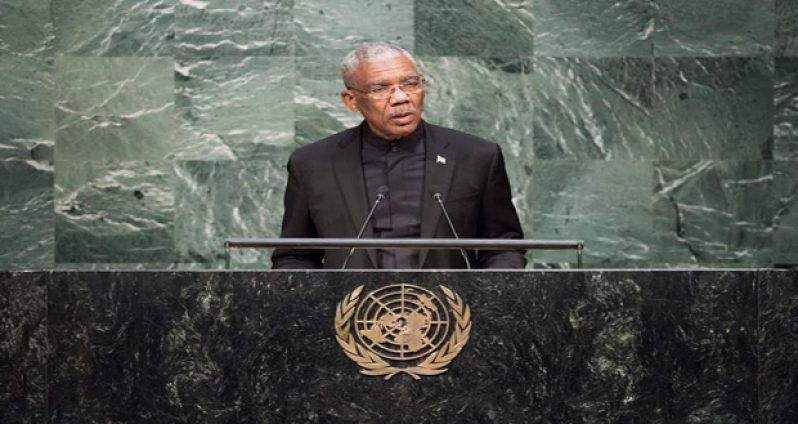PRESIDENT David Granger yesterday threw Guyana’s support behind the new sustainable development goals of the United Nations, but stressed that those goals cannot be achieved in the face of threats and the use of force by one State against the other.“Guyana calls on all nations to eschew recourse to the threat, or use of force in the resolution of controversies,” said Mr Granger at the United Nations headquarters in New York.
His statement was an obvious reference to the border controversy with Venezuela and ahead of a possible meeting he could have with the Venezuelan President Nicolas Maduro, as arranged by the United Nations (UN) Secretary General Ban Ki-moon.

“Guyana recognises the links between peace, security and the rule of law and the successful implementation of this agenda,” the President said.
“Guyana urges that friendship and understanding should underpin relations between states, in consonance with the principles of international law and in a renewed spirit of global solidarity and partnership,” he added.
Leaders of the United Nations are meeting to put their stamp on the so-called Sustainable Development Goals (SDGs) which outline the global way forward to end all forms of poverty. This follows the expiration of the Millennium Development Goals (MDGs) this year.
The 17 SDGs are pegged under three broad areas, namely economic growth, social inclusion and environmental sustainability.
Mr Granger said that Guyana’s development experience is built on the path of sustainable development.
He said Guyana’s policy is to ensure inclusive and equitable quality education and to promote lifelong opportunities for all.
Education – SDG goal No. 4 – is the mother of other goals, the President stated. Education, he said is the gateway to reducing inequality and to empowering all women and girls – goal No. 5.
He said education will boost national efforts in the fight against poverty – goal No 1.
“Guyana over the next five years will have, as one of its foremost priorities of national development, the provision of inclusive and equitable quality education and lifelong learning opportunities for all.”
“Guyana will work tirelessly, in accordance with our national plans and aspirations, to build a modern, peaceful and prosperous nation, in which all citizens share equally in the benefits of development,” the President stated, as he supported the 2030 ‘Agenda for Sustainable Development’.
Mr Granger said Guyana is conscious of the fact that achieving the Sustainable Development Goals for all will require high levels of political commitment.
“This Summit is only a start,” he said, urging nations to work with each other “to confront the difficult but necessary choices which must be made to realise the goal of sustainable development.”
The President said that a reformed and revitalised United Nations development system and intergovernmental machinery, including the Economic and Social Council and the High-Level Political Forum, will be needed to exercise core functions in such a manner that will provide impetus, enable accountability and actualise course correction.
“There must be policy integration to address competing priorities and demands. We count on the United Nations system for effective support in this regard.”
Mr Granger noted that financing will be required to contribute to the implementation of the 2030 Agenda and that both developed and developing nations will be required to play positive roles in accordance with their diverse circumstances and situations.
He pointed to a recent financing conference in Addis Ababa and said the action agenda can provide a strong impetus to efforts to implement the 2030 Agenda. This, he said, is pertinent if the goals would be achieved. These, he outlined, as being a new global social compact for the delivery of social protection and essential public services for all; increased international cooperation in tax matters; debt sustainability; intensified efforts to end hunger and malnutrition; bridging the critical infrastructure gaps; operationalising the technology facilitation mechanism, and employing the Economic and Social Council forum for the follow-up to Financing for Development.
The President ended his speech in giving the commitment that Guyana will work untiringly for the full realisation of the SDGs.
“We are determined to achieve all the sustainable development goals and their targets,” he declared.
By Neil Marks in New York



.jpg)









